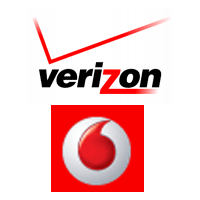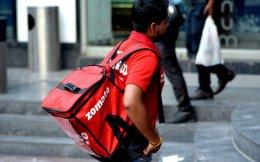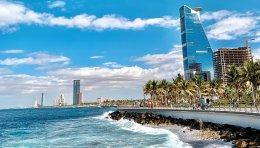Verizon Communications agreed on Monday to pay $130 billion to buy Vodafone Group out of its U.S. wireless business, signing history's third largest corporate deal announcement to bring an end to an often tense 14-year marriage.
The deal in cash and stock will give Verizon full access to the profits from the United States' largest mobile operator, handing it fresh firepower to invest in its mobile network and fend off challengers in a tough market that is fast becoming even more competitive.
For the British group, the accord will allow it to return 71 per cent of the net proceeds - or $84 billion including all of the stock - to shareholders while also ramping up investment in its networks to set itself apart from rivals.
The deal, in which Verizon will buy Vodafone's 45 per cent stake in Verizon Wireless, is the defining event in the careers of Vittorio Colao and Lowell McAdam, the chief executives of Vodafone and Verizon, respectively. They had succeeded in rebuilding relations between the two sides, long strained by clashes about the Wireless dividend and who would eventually seize full ownership.
McAdam told Reuters in an interview that the two men had initially discussed the possibility of combining Verizon and Vodafone before deciding that the stake sale made more sense for both companies.
He said the companies realized they were close to a deal after they spent the morning together in a hotel in San Francisco, chatting while on the exercise bike in the gym and later over breakfast.
The code name assigned to the deal was Project River. "We were Hudson and they were the Thames," he said, referring to rivers in New York and London.
Under the terms, Vodafone will get $58.9 billion in cash, $60.2 billion in Verizon stock, and an additional $11 billion from smaller transactions in a deal that is due to close in the first quarter of next year.
The deal will become the third largest announced deal in the world after Vodafone's $203 billion takeover of Germany's Mannesmann in 1999 and AOL's $181 billion acquisition of Time Warner the following year. Verizon has also managed to raise one of the largest ever financing packages at $60 billion.
"We think we have a balanced approach here," Colao told reporters, adding that he was "super committed" to the next chapter of the company. "We are reducing our debt level which will enable the company to be very robust and take opportunities if they arise."
McAdam said simply that the time was right to buy.
"I think there's going to be a burst of rocket fuel in the Verizon engine as a result of this transaction," the executive told Reuters. He said it was a self-funding transaction because Verizon's earnings per share will immediately increase by 10 per cent, excluding one-time items.
However, the addition of a massive new debt load on Verizon's books, may tie the company's hands on major investments for some time as paying down its debt should be a priority, analysts said.
"It probably, in the short term at least, limits Verizon's ability to do other large transactions," said Macquarie analyst Kevin Smithen. He also worried that Verizon paid too high a price at a time when growth is slowing in the U.S. wireless industry and smaller rivals are competing aggressively on price.
In fact, Verizon is not interested in entering the Canadian wireless market, a Verizon spokesman said confirming McAdam's statements made earlier during an interview with Bloomberg.
Moody's Investors Service downgraded its rating on Verizon after the news to reflect an increase in debt leverage from the addition of about $67 billion of new debt which the credit ratings agency said will more than double Verizon's debt load to $116 billion.
Unanimous backing
The final agreement follows years of speculation as to whether Vodafone, the world's second largest mobile operator, would leave or be forced out of the highly successful business.
Talks between the two sides picked up in earnest over the summer as Verizon grew concerned that its window of opportunity was closing, with interest rates due to rise and its own stock price declining. That prompted Verizon to raise the offer from the $100 billion it had initially floated to close to Vodafone's asking price of $130-$135 billion, sources told Reuters.
For Colao, the timing was also fortuitous as Europe is showing tentative signs of recovery and the U.S. looks headed for tougher competition after Japan's SoftBank Corp, a scrappy mobile competitor at home, took control of Sprint Corp the No. 3 U.S. wireless provider.
"Verizon finally got serious about paying a full price and then there was a lot of good will to work it out," one person familiar with the deal said.
"You have a window in the market where you can lock in a lot of funding at historically low interest rates. Part of the concern was that the window may not be there (forever)."
Both boards unanimously approved the sale.
Since Verizon already had operational control of the wireless company, the deal is not expected to affect its 100 million customers, but its additional financial firepower once it has paid down some of the hefty debt load could help it compete more aggressively against its rivals.
However, although Verizon had long said its control of Verizon Wireless was not restricted by Vodafone's ownership, Forrester analyst Charles Golvin said that the absence of a partner could give Verizon more flexibility in marketing its wireline Internet and television services and its wireless offerings together.
"There was always influence even though Verizon might say they had full decision making control," Golvin said.
New-look vodafone
While Vodafone will lose its best asset, it will get a war chest to reward shareholders, pay down debt and bolster its European operations, which are under pressure from recession and tough regulation.
It said it planned to launch a new investment phase dubbed "Project Spring," to improve its mobile and broadband networks across its networks in Europe and emerging markets such as India and South Africa.
After making one of the largest shareholder returns in history, Vodafone will be left with a $30 billion cash pile. Some 6 billion pounds will go to the Project Spring network investment programme and the rest will be used to pay down debt, bringing down leverage to one times forward operating profit (EBITDA).
Vodafone spent 6.3 billion pounds on network investment in its last fiscal year, so the further 6 billion pounds spread over three years for Project Spring does represent a significant new effort for the group.
Vodafone is not earmarking any of the cash for acquisitions, although Colao said that the group could always borrow later if attractive deal opportunities crop up that would create value for shareholders. Bankers and analysts had expected Vodafone to consider acquisitions in fixed-line assets in Europe after recent deals in Britain and Germany.
Both groups said they would now be in a position to increase their dividend. Vodafone will be left with a U.S. tax liability of around $5 billion, which was lower than some analysts expected.
This is because Vodafone does not have to pay any tax on the gain in the UK or in the Netherlands, where the Vodafone unit which owns the unit being sold is based.
These countries do not levy tax on profits companies make from selling substantial stakes - usually over 10 per cent - in other companies. The tax due in the United States is limited because the seller is a non-U.S. entity.
Lead advisers for Verizon were boutique M&A firm Guggenheim Partners, Morgan Stanley, and Paul Taubman, a former banker at Morgan Stanley.
Barclays and Bank of America Merrill Lynch acted as financial advisors to Verizon, and will also underwrite the $61 billion in financing for the bid alongside JPMorgan and Morgan Stanley. Goldman Sachs and UBS advised Vodafone.
How the deal was sealed
In the end, all it took was a workout session in the gym followed by conversation over breakfast at San Francisco's Four Seasons hotel for Verizon Communications Inc's Lowell McAdam and Vodafone Group Plc's Vittorio Colao to bridge a $30 billion, 10-year-long gap between their companies and strike the third-biggest corporate deal ever.
The two CEOs, who have known each other for 20 years and are close enough to have had dinner at each other's homes, had been in regular touch at least since the fall of last year about the fate of their Verizon Wireless joint venture, which was formed in 2000 and is now the No. 1 U.S. mobile carrier.
In an interview on Monday, McAdam said that he and Colao determined early on that they did not want to merge Vodafone and Verizon into one global telecom behemoth. The alternative - for Verizon to buy out Vodafone's 45 per cent stake in Verizon Wireless - was more attractive.
But the question was: at what price?
In April, sources told Reuters that Verizon was opening the gambit with a roughly $100 billion proposal. In late July, McAdam was discussing the matter on the phone with Colao, who was calling in from Australia. Colao suggested they should meet face-to-face and then flew over to San Francisco two days later, as McAdam was there for a business trip.
"We got up early. We were both down at the gym together, we had a brief conversation on the exercise bicycle," McAdam said, adding they continued to talk over breakfast that morning.
"We looked at the final bit of data, and we said, 'Looks like $130 billion is about the right number and let's see if we can put a deal together around that.'"
They named the project, "River." Verizon was referred to as "Hudson," after the Hudson River that flows past Manhattan; Vodafone as "Thames" because of London's River Thames.
On Monday, after spending another month ironing out the final details, the two reached a deal for Verizon to take complete control of Verizon Wireless. Under the terms, Vodafone will get $58.9 billion in cash, $60.2 billion in Verizon stock and an additional $11 billion from smaller transactions.
The move closes a heady expansionist chapter for Vodafone, one of Britain's best-known companies, which has grown rapidly over the last 20 years through a spate of aggressive deals, taking its brand into more than 30 countries across Europe, Africa and India. Vodafone will return 71 per cent of the net proceeds to shareholders, including all of the stock, in a sign that it does not expect to go on a new acquisition spree.
For Verizon, the deal will provide a massive boost to cash flows at a time when growth is slowing in the U.S. wireless market, where most cellphone users have smartphones, competition is intensifying and carriers are turning to gadgets like tablets to try to grow.
The addition of a massive extra debt load on Verizon's books may, however, tie the company's hands if it wants to make any other acquisitions, including spectrum, at least for a while.
But McAdam said the deal, which also comes at a time when demand for data on mobile devices is growing, would add to Verizon's earnings immediately and essentially pay for itself, thanks to the increased cash flow from Verizon Wireless.
"We're on the verge of another major growth spurt in the U.S. telecommunications market with machine to machine and cloud and video over the top," McAdam said. "They're beginning to buy some broadband assets, like Germany, so they had use for the funds."
The deal could yield close to half a billion dollars in advisory and financing fees for banks. It catapults Guggenheim Partners, a privately owned financial services firm that has been expanding, into the exclusive club of top 10 M&A advisors so far this year. The deal also marks a remarkable return of Paul Taubman, a former top Morgan Stanley (MS.N) dealmaker whom McAdam personally asked to join his army of deal advisers.
Rebuilding relationships
The move is a defining event in the careers of McAdam, 59, and Colao, 51, who rebuilt relations between the companies that had soured after a failed attempt by their predecessors at negotiating the deal in 2004 and subsequent arguments over issues such as how often dividends should be paid from Verizon Wireless to its owners.
Ivan Seidenberg, the former Verizon CEO who retired in 2011, declined to comment on his own efforts to pull together a deal, saying it was McAdam's "day to shine."
"Lowell is a no-nonsense, strong leader (who) leads by example," Seidenberg said in an interview. "He never stops working and learning. If you asked him how many of our stores he has visited, it would amaze you."
McAdam said he benefited from Seidenberg's experience. "He's been very encouraging through the whole process."
Some industry sources said McAdam's relaxed way of dealing with people may have put him in a better position to negotiate with Vodafone than Seidenberg, who they said was very smart, but more combative than McAdam.
"It's a remarkable achievement to be able to do a deal of this magnitude after such a short period at the helm," said Verizon board member Hugh Price, referring to McAdam.
Good negotiator
The early days of McAdam's tenure as CEO were seriously marred by a labor dispute that lasted more than a year and involved a contentious two-week strike by more than 40,000 of its workers in August 2011.
But Larry Cohen, head of the Communications Workers of America union, said that while it was a tough year, his frequent conversations with McAdam during that time were not difficult.
"There's nothing I couldn't talk to him about. I'm not saying we'd agree but you wouldn't have to beat about the bush. He doesn't get excited," Cohen said. "He's somebody who definitely seeks to solve problems, not just to create them or accentuate differences."
McAdam, who grew up in the rural New York town of Somerset and is an engineer by training, likes to keep fit. He socializes with some employees during bike rides or a run rather than over dinner or drinks.
But these workouts often turn into business meetings where the employees have to provide answers on business issues while they're both running or cycling. McAdam, who also served for six years in the U.S. Navy, also likes to restore classic cars in his spare time.
McAdam said dealing with the Vodafone CEO was easy: "I like Vittorio."
Colao drew on a stronger and more trusting relationship with McAdam, meeting him over dinner and wine, and sharing a passion for cycling that once saw them ride in a 50 km (30 miles) race together.
But Colao, who cut his teeth as a management consultant at McKinsey & Co, also believes that negotiating major deals is an art whose finest practitioners know how to wield power and resist pressure. He is said to have used these lessons at the negotiating table to do what his predecessors could not.
"He's a very good negotiator of deals because he is very calm," said Michel Combes, Alcatel-Lucent's CEO who worked with Colao as the head of Vodafone's European operations.
Transformational event
As Verizon was contemplating a roughly $100 billion cash and stock offer in April, Colao was biding his time, making it clear he would only sell the 45 per cent stake at what he considered to be the right price.
In the ensuing weeks, pressure only increased on Verizon as it realized a window of opportunity may again be closing.
Its stock was falling after reaching a 52-week high at the end of April, in part due to rising interest rates and separate deals by rivals Sprint Corp and T-Mobile US Inc that led to expectations that they would become more aggressive competitors.
Moreover, the U.S. Federal Reserve indicated that it may start tapering its massive bond buying program, leading to a spike in rates. That meant it was getting more expensive for Verizon to raise the huge pile of debt it needed to finance the deal, and the costs could rise a lot further if a deal was delayed.
Bankers from Guggenheim, including former Bear Stearns CEO Alan Schwartz and Andrew Decker, had helped Verizon to put together key terms of the proposal.
McAdam also rounded up the rest of the team that Verizon had turned to in 2004 for the deal. He called on Taubman, who had left his job at Morgan Stanley, for advice as well. He also talked with JPMorgan Chase & Co Chief Executive Jamie Dimon, Morgan Stanley's James Gorman and others, several times for advice.
JPMorgan, Morgan Stanley, Bank of America Corp and Barclays Plc are also advising Verizon as well as providing a bridge loan to fund the deal. McAdam said he plans to convert the bridge facility quickly to permanent financing, most of it by the time the deal closes, due in the first quarter of next year.
Goldman Sachs Group Inc and UBS AG are advising Vodafone.
In 2004, when Verizon Wireless was much smaller, there was a $25 billion price tag on the stake, McAdam said. He said a range from $75 billion to $130 billion had been discussed in recent years.
"This is a really transformational event for Verizon," he said.






